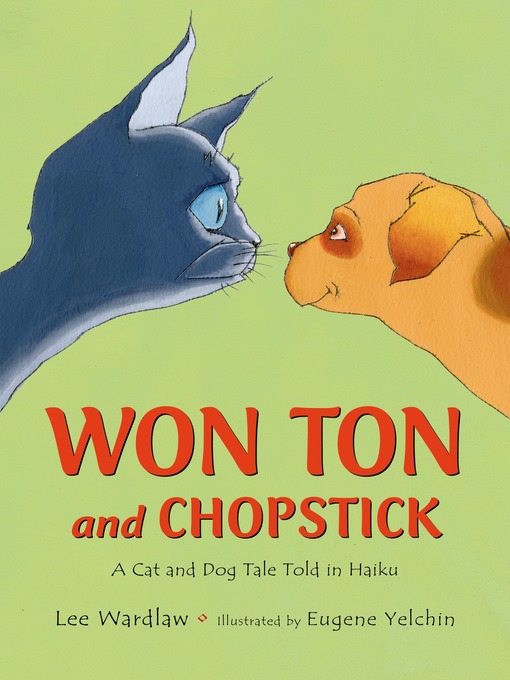
Won Ton and Chopstick
A Cat and Dog Tale Told in Haiku
فرمت کتاب
ebook
تاریخ انتشار
2015
Reading Level
0-1
ATOS
2.4
Interest Level
K-3(LG)
نویسنده
Eugene Yelchinشابک
9780805099881
کتاب های مرتبط
- اطلاعات
- نقد و بررسی
- دیدگاه کاربران
نقد و بررسی

December 15, 2014
Black cat Won Ton's perfect life with Boy hits a puppy of a hiccup. "It's a fine life, Boy. / Nap, play, bathe, nap, eat, repeat. / Practice makes purrfect." Then toys no cat would be interested in show up, and a mysteriously closed door that was never closed before hides a nasty surprise: a dog! "Puthimoutputhim / outputhimoutputhim-wait! / I said him, not me!" Poor Won Ton. The humans name the puppy Chopstick, but Won Ton guesses his real name is Pest. Rules are laid down and broken. An altercation over Chopstick's eating Won Ton's food leads to Won Ton's banishment outside. Won Ton adjusts, but he secretly enjoys Chopstick's encounter with a skunk and revels in the superiority of a self-cleaning cat. One stormy day, though, Won Ton finds puppies make fine pillows. "Some parts of woof I / will never understand. But... / practice makes purrfect." The two snuggle down with Boy. Wardlaw's fine feline phrasing in the haiku-related senryu form of Japanese poetry again pairs neatly with Yelchin's watercolor-and-pencil illustrations. Both capture the canine and the feline in this fresh take on the "new puppy in a cat's house" tale. A satisfying companion to Won Ton's eponymous first outing (2011). (Picture book/poetry. 4-8)
COPYRIGHT(2014) Kirkus Reviews, ALL RIGHTS RESERVED.

December 1, 2014
K-Gr 2-In this charming sequel, a new puppy threatens the titular feline's idyllic existence in an enjoyable spin on the "adjusting to new baby" theme. As in Won Ton: A Cat Tale Told in Haiku (Holt, 2010), Wardlaw relates his tale through a series of senryu, short unrhymed lines of haiku containing a maximum of 17 syllables. This ancient form of Japanese poetry seeks to capture the essence of a moment, and Wardlaw uses it to humorous effect to capture Won Ton's horrified reaction to the new puppy, Chopstick. Won Ton defends his territory against the newcomer and acts out. There's an altercation at the dinner bowl: "Who. Ate. My. Dinner./Your eyes say "no-no," but your/breath brags of tuna." Yelchin's cartoony illustrations, using graphite and gouache on watercolor paper, convey Chopstick's wide-eyed innocence and Won Ton's prickly vulnerability. Though this is a stand-alone sequel, there are echoes of the first book, where readers learned that Won Ton's true name is Haiku; here, readers learn that Chopstick has a true name as well (hint: a famed haiku poet). Abundant wordplay and comic elements, such as Won Ton's repeated cry: "Puthimoutputhim/outputhimoutputhim-wait!/I said him, not me!" make this an enjoyable read-aloud. In the end, Won Ton discovers that he and the puppy have much in common: both enjoy rummaging through the garbage and cuddling with their boy. Peace is restored, and all ends happily. A wide audience of readers will be cheering Won Ton's return as well.-Marilyn Taniguchi, Beverly Hills Public Library, CA
Copyright 2014 School Library Journal, LLC Used with permission.

February 1, 2015
Preschool-G Wonton the cat has lived a privileged life with Boy all to himselfbut now another four-legged intruder has come to stay. The puppy is young and rambunctious and upsets Wonton's quiet, peaceful routine. But who gets in trouble with Boy? It's not the puppy, of course. Puthimoutputhim / outputhim . . . Wait, / I said him, not me! From the early stages of rivalry and intentional disregard to reluctant acquiescence, Won Ton learns to (mostly) share Boy with the puppy, Basho. Wardlaw's humorous poems are further enhanced by Yelchin's delightful, expressionistic graphite and gouache illustrations. This story of sibling rivalry in disguise will ring true for children with younger brothers or sisters or children who acquire a new pet that must acclimate to a home with another animal. Young readers who fell in love with Won Ton in Wardlaw and Yelchin's first book, Won Ton: A Cat Tale Told in Haiku (2011), will enthusiastically welcome this new adventure, and those not yet familiar with the earlier book will likely seek it out.(Reprinted with permission of Booklist, copyright 2015, American Library Association.)

























دیدگاه کاربران